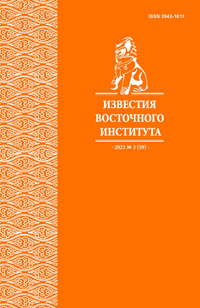Memory politics of the countries of Northeast Asia about the Second World War on the example of the Khasan events
DOI:
https://doi.org/10.24866/2542-1611/2023-3/38-47Keywords:
Memory politics, international relations, historical memory, Northeast Asia, Battle of Lake KhasanAbstract
This article discusses the application of the concept of "memory politics" for the analysis of the symbolic
space of international relations of the countries of Northeast Asia, within the constructivist approach. The result of the memory politics in different states may be a discursive and media clash of different versions of the historical past. The states of this region have many contradictions in understanding the common past. As a key example of a comparative analysis of memory politics, this study uses the Hassan events as part of the narrative of collective memory of World War II. It is concluded that there is a high degree of polarization in the understanding of this historical event within the framework of the "pro-Soviet" (Russia and China) and "pro-Japanese" (Japan and Republic of Korea) narratives, which focus on different aspects of what happened, and also refer to different historical contexts and processes, which can serve as a marker reflecting the complexity of building a single ideological basis for the regional integration of the countries of Northeast Asia.




